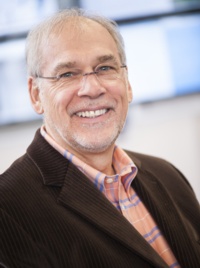2022 AMS President Richard Clark
We come away from our centennial celebration a community with a shared vision of Building Within, Reaching Beyond, with renewed purpose and vigor, poised to confront the challenges that demand our attention as scientists, citizens, and members of the AMS.
A major challenge is set by this vision; to extend our reach. The AMS mission – advancing science, serving society, is relevant across an expansive enterprise where scientific expertise in the areas of weather, water, climate, policy, communication and related fields serves as an undergirding to critical thinking and responsible decision-making on scales from local to global. The AMS approved 21st century initiatives to build local collaboration networks; champion scalable global geoscience organizational partnerships; develop an AMS volunteering program; enhance our existing historical research network; and catalyze life-long professional development and career advancement. Our challenge is to align the human and technological capital of our AMS with the roadmap charted by these initiatives such that our reach becomes global, commitment to diversity, equity, and inclusion real and actionable, our message and impact strengthened and extended, and resources leverage to achieve our strategic goals.
There is the overarching challenge of ensuring that the foundation of our Society remains strong and enduring. Scientific integrity and transparency are hallmarks of trust inherent in the Society’s business, publications, and the conduct of its members. To sustain a vibrant Society into its second century, the AMS value proposition must be to create meaningful opportunities for its members that keep pace with workforce transformations. These initiatives will help foster an environment that can leverage its membership capacities across all sectors through collaborative networks.
As your AMS President, I promise to be your standard-bearer for these initiatives and all aspects of the Society. I will lead efforts to foster outreach and cross-sector collaboration across the enterprise, promote scientific breadth and diversity, and stimulate opportunities for members.
Richard Clark
Richard D. Clark is Chair of the Department of Earth Sciences and Professor of Meteorology at
Millersville University. His research in boundary layers and air chemistry led to participation in
major field campaigns involving over 200 undergraduate students, among them, NARSTO-
NEOPS (EPA), DISCOVER-AQ (NASA), OWLeS, PECAN, and SEAR-MAR (NSF). He has
contributed to many educational opportunities, including the development of a concentration in
Heliophysics and Space Weather, an M.S. in Integrated Scientific Applications to prepare
business-ready scientists, and a Certification in Space Weather and Environment: Science, Policy,
and Communication to advance understanding and communicate risks.
Clark is a Fellow of the AMS and was elected to Council (2008-11). As an AMS member for 33
years, his service includes the International Volunteering Program, Board of Higher Education,
Nominating Committee, STAC and APT Committees, and as co-organizer of several AMS
conferences, workshops, and symposia, including the First Student Conference. Student
participation at AMS, AGU, NWA, WRMA, and agencies’ functions are central to Clark’s
commitment to student success and the viability of these organizations.
Clark was elected to the UCAR Board of Trustees (2009-2015) and has served on all UCAR
governance committees, strategic planning workshops, and search committees. His contribution
to science advocacy, building relationships, and access to data and tools on behalf of the
university community is manifest through leadership on UASC, PACUR, and Unidata
Governance Committees. His collaboration with NCAR/EOL and COMET on SEGUE (NSF) will
soon result in modules on instrumentation and measurement being available to the community.
Clark also served on other NSF initiatives (e.g. EarthCube) and panels, notably as chair of the
NSF/NCAR/EOL Observing Facilities Advisory Panel (OFAP).
Clark has a Ph.D. in atmospheric science from the University of Wyoming (’87) and is the
recipient of the 2006 Russell L. DeSouza Award for Outstanding Contributions to the Unidata
Community and the 2008 AMS Teaching Excellence Award.
